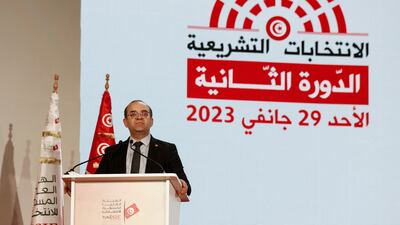Tunisia recorded an 11.4 per cent turnout for its parliamentary elections, Independent High Authority for Elections president, Farouk Bouasker, said on Monday night.
In its official announcement of preliminary results, the commission said 154 members of the parliament’s House of Representatives were elected in the first and second round of Tunisia’s parliamentary elections.
Only 25 women won seats in the first chamber of parliament.
Critics said the low turnout could discredit the new parliament’s House of Representatives.
Monday’s election, along with the first round in December, brought in some new faces and the return of some familiar ones to the House of Representatives.
Member of the 2011 Constituent Assembly, Hishem Hosni, has been re-elected after facing no competition in La Goulette during the first round.
Some former deputies from the 2014 parliament and the dissolved 2019 legislature, have also been re-elected.
Familiar names such as Fatma Mseddi, Imed Ouled Jibril, Sami Abdelaal, Riyadh Jaiden and Nacer Channoufi are some of the returning members of parliament, running individually this time instead of representing their former parties of Nidaa Tounes and Qalb Tounes.
Tunisia’s electoral law was changed through a decree issued by Tunisian president Kais Saied in September, with one major change being that voters now cast ballots for people instead of party lists
Also returning to the new parliament through this new system of voting are current members of the nationalist-affiliated People’s Movement party, Ridha Delai, Abdelrrazek Aouidet and Badreddine Gammoudi.
The People’s Movement is one of the few parties that have shown their support to Mr Saied’s decisions since July 25, 2021.
“The electoral law does not prevent parties from running — this is a fallacy that we need to clarify,” member of the electoral body, Maher Jdidi, said on Monday.
Others who have secured a seat in Tunisia’s House of Representatives include Ibrahim Bouderbela, former dean of the lawyer’s bar and member of the committee that was set up by Mr Saied to draft a new constitution.
They also include Faouzi Daas, member of Mr Saied’s electoral campaign and one of the most well-known members of his close circle.
The electoral was criticised by civil society observers who said Sunday’s ballot "lacked transparency".
The elections body denied these claims and called on those who have any evidence to go to court.
“The authority’s board does not give instructions to its working members to withhold information from journalists and observers,” Mr Jdid said on Sunday.
Tunisia’s High Independent Elections Authority said that the newly elected House of Representatives will be expected to hold its first session less than two months after Monday’s results.
“Following exhausting the period of appeals at Tunisia’s Administrative court, which could take up to one month, we will be issuing the final results,” Mr Bouasker said.
“Following that [final results] the elected parliament will be called to hold its first session within the 15 days that follow."


